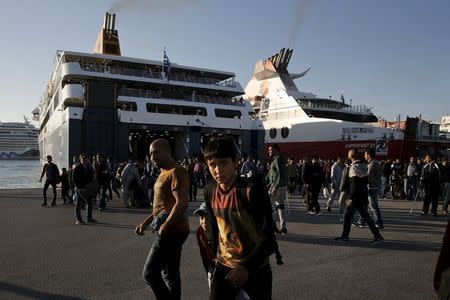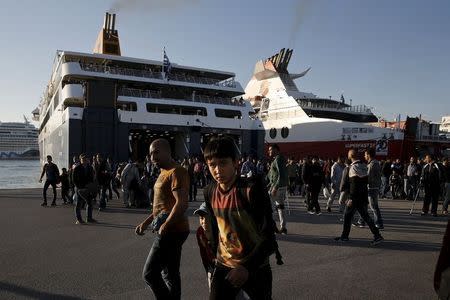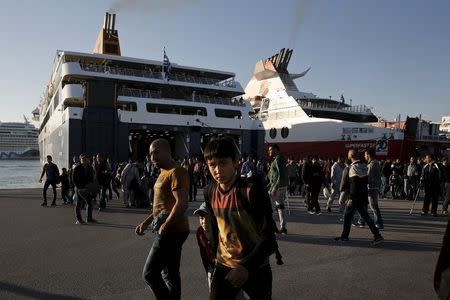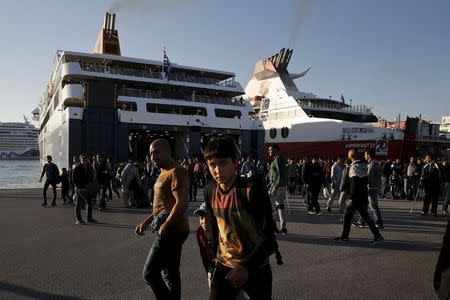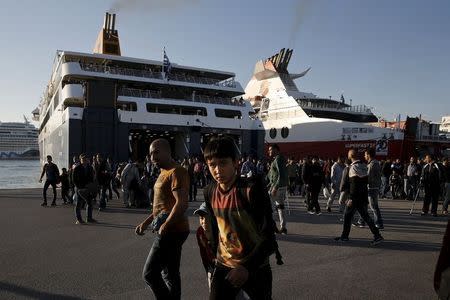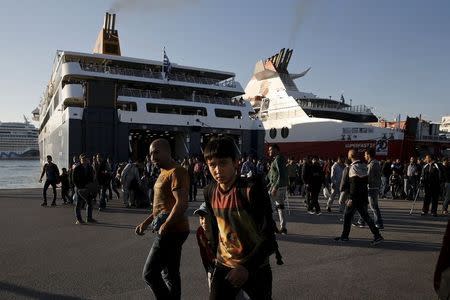EU offers Turkey cash, closer ties for migration help
By Paul Taylor and Alastair Macdonald
BRUSSELS (Reuters) - The European Union offered Turkey a possible 3 billion euros ($3.4 billion) in aid and the prospect of easier travel visas and "re-energised" talks on joining the bloc in return for its help stemming the flow of migrants to Europe.
EU leaders at a summit in Brussels said they agreed on an "action plan" with Turkish President Tayyip Erdogan to cooperate on improving the lives of two million Syrian refugees in Turkey and encouraging them to stay put.
They also agreed to coordinate border controls to slow the influx of migrants crossing Turkey from Asia.
Though the plan put no figure on "substantial and concrete new funds" the EU would offer, German Chancellor Angela Merkel said the figure of 3 billion euros, which EU officials said Ankara had requested, had been discussed and seem reasonable.
"Our intensified meetings with Turkish leaders ... in the last couple of weeks were devoted to one goal: stemming the migratory flows that go via Turkey to the EU. The action plan is a major step in this direction," said summit chairman Donald Tusk, expressing "cautious optimism".
In formal conclusions agreed by the 28 national leaders at a meeting that ended after midnight, Turkey was offered an accelerated path to giving its citizens visa-free travel to the EU, provided it met previously agreed conditions.
Progress would also depend on Ankara showing real help in slowing migration and would be reviewed next spring.
Merkel, who will visit Istanbul for talks with Erdogan on Sunday in a political gesture two weeks before a Turkish general election, said it was clear that Europe's efforts to filter and process refugees would not work without Turkey's cooperation.
"The hotspots alone won't solve the problem," she said.
CONDITIONS APPLY
French President Francois Hollande stressed that Turks would not be getting visas on easier terms. One condition still to be met is for Ankara to first stop granting such easy entry to Pakistanis, Afghans and others who end up heading to Europe.
It must also first sign and implement a previously agreed deal to take back from Europe migrants who fail to win refugee status. "There must be no misunderstandings," Hollande said.
European governments are wary of granting full visa-free access to 78 million Turks. Any liberalisation is likely to be limited at first to business travellers and students.
Leaders also agreed to "re-energise" moribund, decade-old negotiations on Turkey's application for membership of the European bloc, though they left open exactly how to do that.
"The accession process needs to be re-energised with a view to achieving progress in the negotiations in accordance with the negotiating framework and the relevant Council conclusions," they said, in language couched cautiously to reflect concerns in Cyprus and other states about easing off pressure on Ankara.
Earlier, at talks in Ankara with a delegation from the executive European Commission, Turkish ministers had asked the EU to start easing restrictions for some Turks travelling to the EU by the middle of next year, EU officials said.
EU sources said they sought 3 billion euros ($3.4 billion) in new financial aid and the opening of six so-called chapters of the accession process, concerning harmonising rules in energy, justice and economic and monetary affairs among others.
Turkey was also seeking more high-level political dialogue with invitations for Erdogan to summits after an ice-breaking visit he made to Brussels earlier this month.
BORDER MEASURES
The bulk of the written agreements approved by the leaders concerned measures the EU is in the course of putting in place to deal with the crisis caused by the arrival of hundreds of thousands of people in the biggest migration movement the continent has seen since World War Two.
After a summer of bitter arguments among leaders on how to share responsibility for accommodating refugees, the focus has turned to aid for neighbouring states to reduce pressure to leave and on bolstering border controls, speeding up the deportation of failed asylum-seekers and on a possible EU frontier force.
However, leaders had what Merkel called a long and serious talk about the possibility of reforming the EU asylum system by going beyond pilot schemes to create a permanent mechanism to relocate asylum claimants around the EU by national quotas.
Merkel, who has taken a lead in welcoming Syrian refugees but is now under domestic political pressure to ensure Germany does not house the bulk of new arrivals, said there was still much work to do to forge a consensus on distribution.
Pushing back against ex-communist states that do not want large numbers of immigrants, she said: "In the end we are all Europeans, and this refugee question will challenge all of us."
Turkey wants to be put on a list of "safe countries", whose nationals would not normally be granted asylum in Europe. The issue was not discussed at the summit. Germany is concerned about Turkish Kurds who might seek refuge in Europe. EU officials stress that all asylum claims will still be assessed.
Embracing Turkey and especially Erdogan, who critics see as increasingly authoritarian, poses dilemmas for EU leaders.
But the EU's political priority has changed: "In our neighbourhood, we are not asking any more for fundamental rights after the Arab Spring," said a senior EU political leader. "We are asking for stability."
Many doubt whether such a populous, mostly Muslim country can ever join the Union. Yet the EU is desperate for help.
Efforts to end the division of Cyprus between the Greek-speaking state that is an EU member and the Turkish-backed one in the north of the island are also a factor. EU diplomats worry that Erdogan may use the migration crisis as added leverage.
"We understand the added value of Turkey," one said. "But we cannot give it carte blanche."
Adding to uncertainties in negotiating any deal with Turkey is the turmoil that followed a bombing Ankara blames on either Kurds or Syria-based Islamists, as well as a snap parliamentary election on Nov. 1 that will determine Erdogan's future powers.
(Additional reporting by Francesco Guarascio, Jan Strupczewski and Chine Labbe; Editing by Ken Wills)



